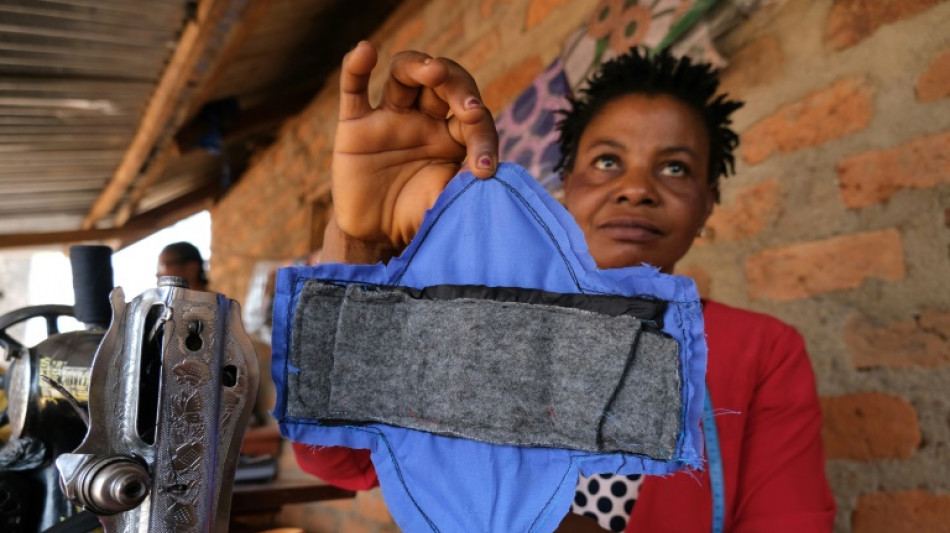
-
 Rangers hire two-time NHL champion Sullivan as coach
Rangers hire two-time NHL champion Sullivan as coach
-
Haaland on bench for Man City as striker returns ahead of schedule

-
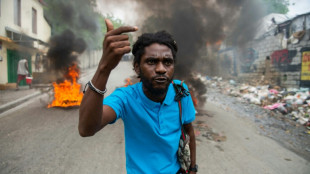 US designates two Haitian gangs as terror groups
US designates two Haitian gangs as terror groups
-
Lower profits at US oil giants amid fall in crude prices

-
 NBA icon Popovich stepping down as Spurs coach after 29 seasons
NBA icon Popovich stepping down as Spurs coach after 29 seasons
-
'Devastated' Prince Harry says no return to UK but seeks royal reconciliation

-
 Grande scratched from Kentucky Derby
Grande scratched from Kentucky Derby
-
Carney vows to transform Canada economy to withstand Trump

-
 Prince Harry says he would 'love' to reconcile with family
Prince Harry says he would 'love' to reconcile with family
-
Major offshore quake causes tsunami scare in Chile, Argentina
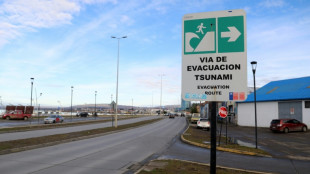
-
 GM cuts shift at Canada plant over 'evolving trade environment'
GM cuts shift at Canada plant over 'evolving trade environment'
-
F1 extends deal to keep Miami GP until 2041

-
 Popovich mixed toughness and spirit to make NBA history
Popovich mixed toughness and spirit to make NBA history
-
US asks judge to break up Google's ad tech business

-
 Trump eyes huge 'woke' cuts in budget blueprint
Trump eyes huge 'woke' cuts in budget blueprint
-
Ruud downs Cerundolo to book spot in Madrid Open final

-
 Gregg Popovich stepping down as San Antonio Spurs coach after 29 seasons: team
Gregg Popovich stepping down as San Antonio Spurs coach after 29 seasons: team
-
Guardiola to take break from football when he leaves Man City

-
 Vine escapes to Tour of Romandie 3rd stage win as Baudin keeps lead
Vine escapes to Tour of Romandie 3rd stage win as Baudin keeps lead
-
Olympic 100m medalist Kerley arrested, out of Miami Grand Slam meet

-
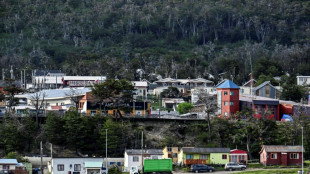 Chile, Argentina order evacuations over post-quake tsunami threat
Chile, Argentina order evacuations over post-quake tsunami threat
-
Arteta 'pain' as Arsenal fall short in Premier League title race

-
 Hard-right romps across UK local elections slapping down main parties
Hard-right romps across UK local elections slapping down main parties
-
US ends duty-free shipping loophole for low-cost goods from China

-
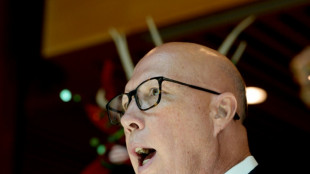 Renewables sceptic Peter Dutton aims for Australian PM's job
Renewables sceptic Peter Dutton aims for Australian PM's job
-
Australians vote in election swayed by inflation, Trump

-
 Syria slams Israeli Damascus strike as 'dangerous escalation'
Syria slams Israeli Damascus strike as 'dangerous escalation'
-
Grand Theft Auto VI release postponed to May 2026

-
 Lawyers probe 'dire' conditions for Meta content moderators in Ghana
Lawyers probe 'dire' conditions for Meta content moderators in Ghana
-
Maresca confident Chelsea can close gap to Liverpool

-
 Watchdog accuses papal contenders of ignoring sex abuse
Watchdog accuses papal contenders of ignoring sex abuse
-
Berlin culture official quits after funding cut backlash

-
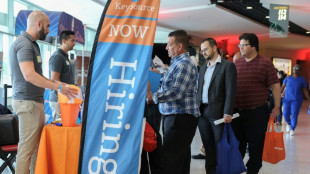 US hiring better than expected despite Trump uncertainty
US hiring better than expected despite Trump uncertainty
-
EU fine: TikTok's latest setback

-
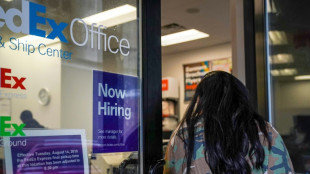 Stocks gain on US jobs data, tariff talks hopes
Stocks gain on US jobs data, tariff talks hopes
-
Barca's Ter Stegen to return from long lay-off for Valladolid trip

-
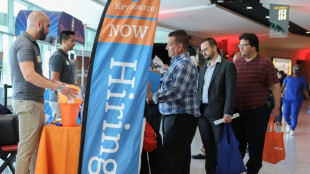 US hiring slows less than expected, unemployment unchanged
US hiring slows less than expected, unemployment unchanged
-
Man Utd must 'take risk' and rotate players as they target European glory: Amorim

-
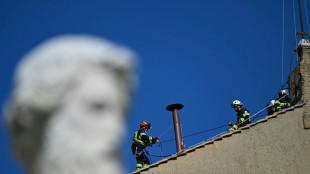 Vatican chimney installed ahead of papal conclave
Vatican chimney installed ahead of papal conclave
-
Toulouse's Ramos to miss Champions Cup semi with injury

-
 Grand Theft Auto VI release postponed to May 2026: publisher
Grand Theft Auto VI release postponed to May 2026: publisher
-
S.African mother found guilty of selling young daughter

-
 EU wins post-Brexit fishing row with Britain
EU wins post-Brexit fishing row with Britain
-
Activists say drones attacked aid boat bound for Gaza

-
 Israel says struck near Syria presidential palace amid Druze clashes
Israel says struck near Syria presidential palace amid Druze clashes
-
Eurozone inflation holds above expectations in April
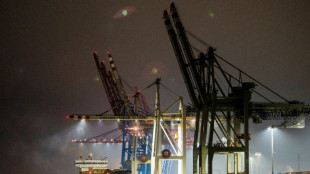
-
 Orgies, murder and intrigue, the demons of the Holy See
Orgies, murder and intrigue, the demons of the Holy See
-
'Deadly blockade' leaves Gaza aid work on verge of collapse: UN, Red Cross
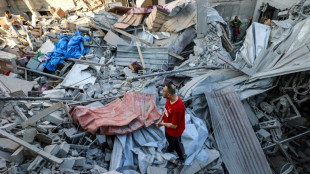
-
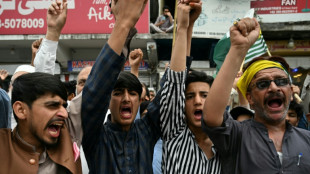 Pakistani Kashmir orders stockpiling of food as India tensions flare
Pakistani Kashmir orders stockpiling of food as India tensions flare
-
Stock markets gain as China mulls US tariff talks
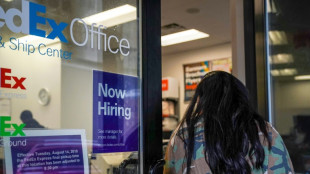

Cost, taboo make menstruation a nightmare for Cameroonian refugees
On the day Geraldine Mbia Enu fled her home with her three children to escape the conflict in southwestern Cameroon, her period began.
Having hastily gathered her belongings when the sound of gunshots inched closer to her village, she'd forgotten to take menstrual pads.
So on their exhausting seven-day trek to neighbouring Nigeria in 2018, the 33-year-old had to make do -- like many women in similar situations.
"We just used pieces (of cloth) to pad ourselves," she said.
Even after reaching safety, the challenges are manifold for menstruating refugee women who have abandoned their homes and lost their livelihoods.
One million people have fled the violence in Cameroon between security forces and rebels fighting for an independent state.
More than 70,000 of them have arrived in Nigeria.
- 'Too expensive' -
Magdalene Ajili lives in one of three camps set up in Ogoja, eastern Nigeria, with her 86-year-old grandmother, her two daughters and their children.
She also sought refuge in 2018 after becoming separated from her husband when they fled their village and has since lost contact with him.
"I’m the head of the family," she said, "I take care of the family for food."
However, when it comes to sanitary pads "it's not possible (to buy them) as it’s too expensive," she added.
A pack of sanitary pads costs about 600 naira (1.2 euros) -- or a fifth of the cash they receive every month from the UN refugee agency (UNHCR).
"Most of the refugees cannot afford the cost of (the) monthly purchase of disposable pads," said UNHCR's gender-based violence protection officer in Ogoja, Mmone Moletsane.
UNHCR and its NGO partner distribute washable and reusable pads.
- Missing school -
"I preferred the ones we were using in Cameroon, disposable ones, but the pads they gave us are ok," said 16-year-old Christabel, another refugee.
For three years, Ajili has been using the same reusable pads provided by the UN.
She says she is happy with them but would like to get new ones. "Sometimes... it gives me rashes," she said.
But the UNHCR says it doesn't have the funds to provide new pads, or to give packs to every single refugee.
Many other women uprooted by the conflict in Cameroon live outside the official camps and have not received any pads at all.
They use what they can find -- pieces of cloth -- despite the risk of infection.
Lack of proper protection means that sometimes girls "miss school when they are menstruating", said Moletsane.
Older women often miss work.
On top of the practical challenges, the subject of periods is taboo in Nigeria, as in many countries around the world, she added.
That makes it difficult, for instance, to dry washable pads outdoors which is important for avoiding bacteria, or when girls have to share the same toilet block as boys at school.
- New buyers -
Some refugees are taught how to make reusable pads to sell.
Mbia Enu has made about a hundred using materials provided by Save the Children.
The charity also bought the pads she made and distributed them to those in need.
But Mbia Enu is now struggling to find new customers among the refugee community.
The pads she makes -- sewed using three layers of different types of cloth including a waterproof one -- are sold for 800 naira for a pack of three.
Determined to find new buyers, Mbia Enu used her meagre savings to travel to a market in Ikom, about 90 kilometres (56 miles) away, where she convinced a shop owner to buy the pads.
"He thinks Nigerian women might be interested in buying them," Mbia Enu said, hopefully.
Period poverty doesn't just affect refugees but also millions of poor Nigerian women.
Inflation has hit Nigeria hard this year, and the price of sanitary products has gone up like everything else.
According to the government, 37 million women in the country cannot afford menstrual pads.
Y.Nakamura--AMWN